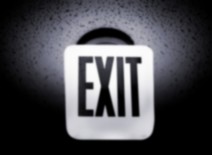토요일 제 발표는 신시아가 대신 해주었고(아주 잘~ ^^) 토론에는 이성규 몽양부활님이 대신 참석해주었습니다. 감사합니다.
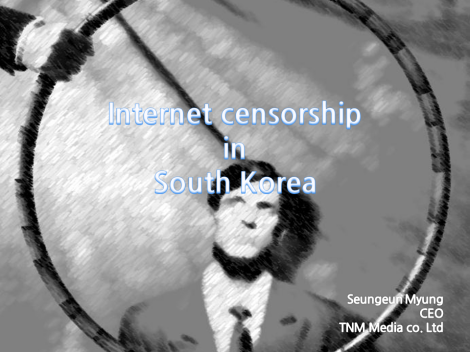
Today, I want to discuss South Korea’s Internet environment and some of our problems.
Everyone knows that South Korea has a fast-growing economy and is a telecommunications leader with most of its population online and they are very active online.
However, South Korea is also described as a country that has strong internet censorship policies. In some ways much like China or some countries in the Middle East. So today, I will describe how Korea developed such Internet censorship policies and the problems caused by such policies.
오늘 저는 한국 인터넷의 상황과 몇 가지 문제점들을 다뤄보려 합니다.
한국은 빠르게 성장하는 국가이며 경제활동인구 대부분이 인터넷을 사용하고 있는 정보통신 강국입니다.
많은 사람들이 인터넷을 활발하게 이용하고 있습니다.
하지만 그와 동시에 한국은 몇 가지 이유로 인터넷을 통제하는 국가에 분류되기도 합니다. 마치 중국이나 중동 국가와 마찬가지로 말이죠.
과연 한국에는 인터넷을 왜 통제하게 됐고 이 문제가 어떤 부작용을 낳고 있는지를 이야기하겠습니다.
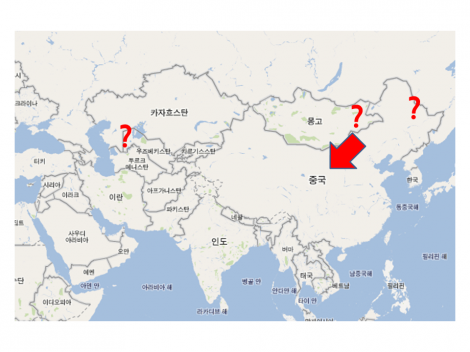
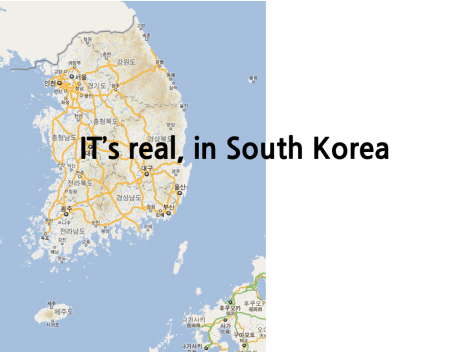
This is happening in South Korea.
이것은 한국에서 벌어지고 실제 이야기입니다.
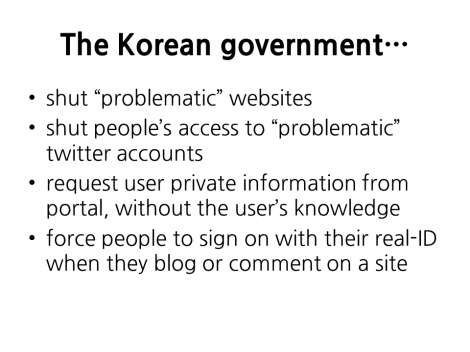
The Korean gov’t shuts access to “problematic” twitter accounts.
The Korean gov’t can request access to people’s private information from any portal site or ISP, without the user’s knowledge.
The Korean gov’t can force people to sign on with their real-ID when they blog or comment on a site. Later, this information can be used in any police investigation or legal suit.
한국 정부는 "문제가 있는" 사이트를 국민이 아예 접속하지 못하게 할 수 있습니다.
한국 정부는 "문제가 있는" 트위터 사용자의 계정에도 접속하지 못하게 할 수 있습니다.
한국 정부는 포털 사이트 등 ISP들에게 "사용자 몰래" 사용자의 개인신상정보를 달라고 요청할 수 있습니다.
한국 정부는 인터넷에서 댓글이나 블로그 글을 쓸 때 본인인증을 해야만 글을 쓸 수 있게 할 수 있습니다. 나중에 이 정보는 소송이나 수사의 기초 자료입니다.
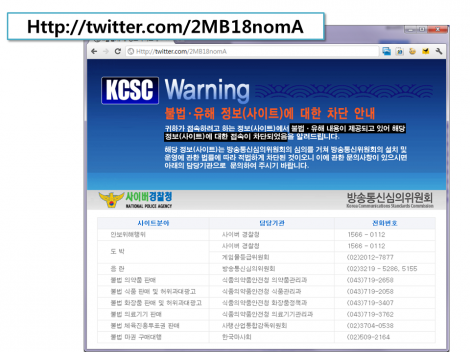
Do you think this is a little strange?
Take a look at this page.
This twitter account was shut-down because its Korean pronunciation sounded like it was calling the current President an “asshole”.
The Korean Police and Korea Communications Standards Commission shut this twitter account so that no one in Korea can see this.
Many websites can be shut down for having content related to “lewdness, violence, illegal weapons, illegal medical supplies”.
And this twitter account holder is now being investigated by the police.
It’s surprising.
이상하다구요?
여기를 접속해보세요.
사용자 계정이 한국어로 발음하면 대통령을 욕하는 말로 들린다는 이유로 차단당했습니다.
트위터 서비스가 안 보이도록 경찰과 방송통신심의위원회가 이 사이트를 한국 안에서는 접속할 수 없게 했습니다.
수많은 음란, 폭력, 불법 무기, 불법 의약품 사이트들도 이런 식으로 차단 당합니다.
이 사용자는 지금 경찰 조사를 받고 있습니다.
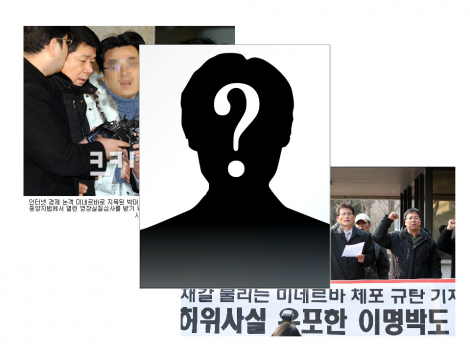
How about this example?
This person was arrested for criticizing the government online.
His Internet ID was Minerva.
He wrote anonymously. Some of his posts were wrong and fanciful. But some were surprisingly insightful.
But how could he be arrested even though he wrote anonymously?
이건 어떤가요?
인터넷에 정부를 비판하는 글을 올린 사람이 체포당한 일이 있었습니다
인터넷 닉네임은 미네르바였습니다.
이 사람은 자신의 신분을 숨기고 어떤 것은 거짓말로, 어떤 것은 놀라운 통찰력을 보여주는 글을 썼습니다.
그런데 이 사람은 어떻게 신분을 숨기고 글을 썼는데 체포될 수 있었을까요?
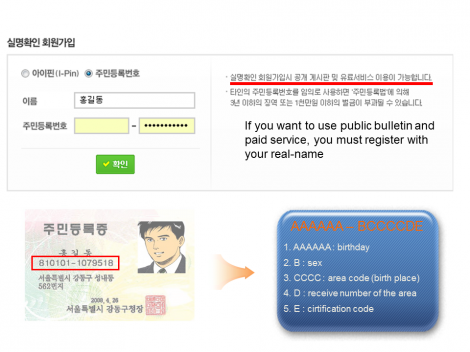
That’s because in Korea, it’s very easy to get private information on people who criticize the government or post illegal content on the internet.
In Korea, if you want to post content on any of the portal sites, you must register with your real-name.
Any government or police investigator can request personal information such as your real name, national ID number, contact number and address to the portal sites.
It was easy for the police to find and arrest him.
한국에서는 이렇게 인터넷에 불법 정보나 정부를 비판하는 글을 쓴 사람의 신상을 금방 파악할 수 있습니다.
포털 사이트에서 글을 쓰려면 본인 인증을 거쳐야 합니다. 이런 개인정보는 정부와 수사당국이 포털에게 달라고 하면 실명과 주민등록번호, 연락처, 주소 등 개인정보를 넘겨줍니다.
경찰은 손쉽게 그를 체포할 수 있습니다.
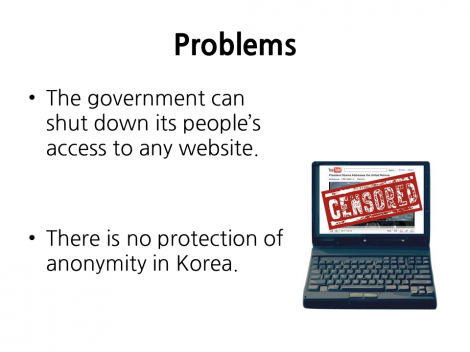
The first is that the government can shut down its people’s access to any website.
It’s no different from censorship policies in China and North Korea.
The Korean gov’t argues that it wants to protect people from harmful content like: foreign porn, illegal information and North Korean propaganda.
Perhaps we can agree with some of this reasoning.
However, the definition of “harmful content” is extremely overbroad. In actual practice, government agencies are defining any site that criticizes the government or provides information against government interest, as “harmful content” and shutting it down.
Another problem is that there is no protection of anonymity in Korea.
If you criticize the government or politician or write any incorrect information (even if by mistake), the police can knock at your door.
You don’t need to give your real name to set up a facebook or twitter accounts. but in Korea, almost every Internet service ‘forces you’ to register with your real ID.
여기서 문제는 두 가지입니다.
인터넷 정보를 정부가 임의대로 국민들이 접근할 수 없도록 원천 차단할 수 있다는 것입니다.
이것은 중국이나 중동, 북한에서 특정 사이트를 국가 단위로 차단하는 것과 같습니다.
정부가 특정 사이트를 차단하는 것은 해외 음란, 불법 정보와 북한 사이트 등으로의 접근을 원천적으로 막겠다는 의도입니다.
일부 수긍할 수 있습니다.
하지만 사이트를 차단하는 기준 가운데 ‘위해 정보’라는 포괄적인 기준이 문제입니다. 사실상 정부에게 불리한 주장이나 의견, 정부를 비난하는 정보를 담은 사이트 자체를 ‘위해 정보’라고 자의적으로 판단해 차단한다는 것이 문제입니다.
또 하나는 한국에서 글을 쓸 때는 익명으로 글을 쓸 수 없다는 것입니다.
정부나 정치인을 비판하거나 실수라도 잘못된 정보를 올리면 당장 경찰이 찾아올 수 있습니다.
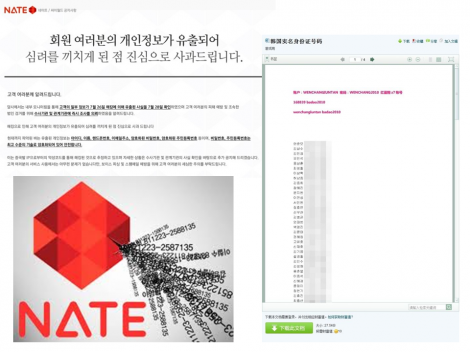
It has destroyed people’s right to anonymity and this is a violation of our freedom of expression.
Last week, we learned that the third largest portal site, Nate.com and social networking site Cyworld were hacked.
About 35 million people’s information was hacked. Private information like your name, national ID number, cell number, address, all verified information was hacked. Korea’s population is about 50 million, with about 25 million workforce and 39 million internet users.
사실 가장 문제는 이것입니다.
국민들이 익명으로 말할 수 있는 권리를 원천적으로 박탈한 것입니다.
이것은 표현의 자유의 문제입니다.
얼마 전 한국에서 3위 포털 사이트인 네이트닷컴과 싸이월드의 개인정보가 송두리째 해커에게 유출당하는 사고가 있었습니다.
무려 3500만명의 데이터입니다. 이 개인정보는 모두 본인인증을 거친 ‘실제 데이터’입니다. 실제 이름, 주민등록번호, 휴대폰번호, 주소 모두 담겨져 있습니다.
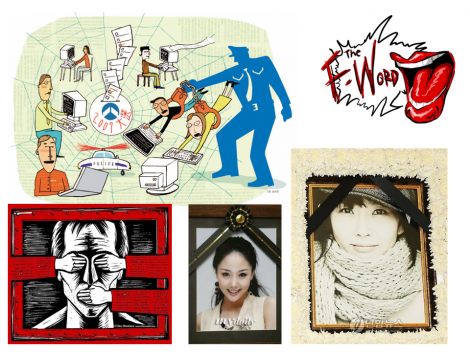
Why does Korea persist in using this real-ID system?
First, it was because of elections.
During the campaign period, it’s illegal for people to express support for candidates or share negative information about them online.
To find out who were doing this, the government created the real-ID system where people must register their real-name to any site that has more than one hundred thousand daily visitors.
Another reason is that the public thinks famous Korean celebrities committed suicide because of online rumors.
Of course no one has asked these celebrities whether that was the cause, and there’s no way for us to know the truth.
그러면 왜 한국은 실명제를 채택하고 있는 것일까요?
먼저 선거 때문에 그랬습니다.
인터넷에서 누구를 편향되게 지지하거나 상대방 후보에게 불리한 정보를 올리는 것을 불법으로 규정해놓았습니다.
이 불법을 저지르는 사람이 누구인지 알아야 합니다.
그래서 정부는 하루 방문객 10만 명 이상의 사이트에서는 ‘본인인증’을 거쳐야만 글을 올릴 수 있도록 했습니다.
또한 유명 연예인의 자살이 악플 때문이라고 생각하고 있습니다.
유명 연예인의 뉴스 기사에 저주와 욕설이 담긴 댓글이 많아서 심리적인 충격을 받고 그 사람이 자살을 선택했다는 것입니다.
물론 죽은 연예인에게 진짜 악플 때문에 자살했냐고 물어본 사람도 없고 대답한 사람은 없습니다.
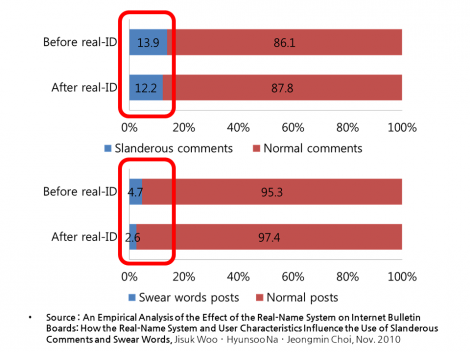
If the goal of the real-ID system is to get rid of such illegal information or harmful content, has it achieve its goal?
Yes, it has. BUT very little.
Negative comments on BBS was about 13.9% of the total, and following the policy, it went down to 12.2%.
실명제의 취지대로 이런 불법 정보를 비롯해 악의적인 글을 없애는 효과가 있었을까요?
네, 있었습니다. 아주 조금.
비방 게시글이 실명제 이전에는 전체 게시글 가운데 13.9%였는데 실명제 실시 이후 12.2%로 1.7% 줄었습니다.
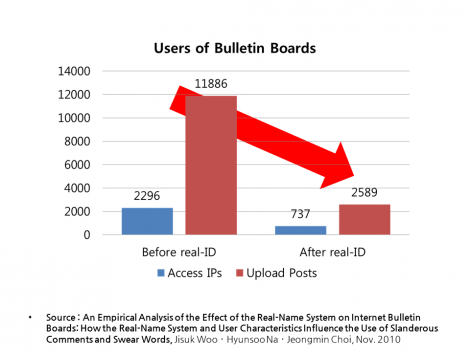
Before the real-ID policy, there were about 2500 IP addresses (in the BBS) but it decreased by 68% to about 700.
So people didn’t start acting nicer on the net, a lot of people just stopped writing on the net.
그런데 인터넷에서 글을 쓰는 사람들이 더 많이 줄었습니다.
특정 게시판에서 실명제 전에는 2585개 IP에서 글이 올려졌는데 실명제 이후에는 737개 IP로 3분의 1로 줄었습니다.
많은 사람들이 '바람직한 글'을 쓰는 사람이 되기보다 아예 글을 아예 쓰지 않게 된 것이죠.
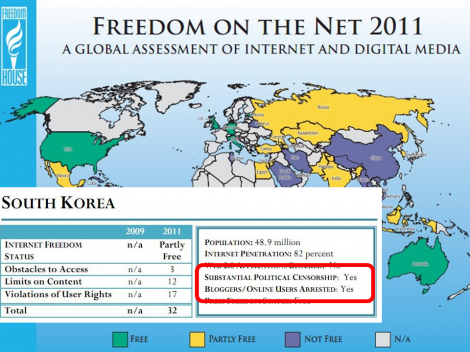
The real-ID system was created out of government interest.
The Nate-hacking incident showed how it creates huge security risks and privacy issues and it has also violated people’s freedom of expression.
And it’s not even effective. The law doesn’t affect foreign services such as Facebook or Twitter.
And now in Korea, there is a growing movement to get rid of this system.
I’m not sure what’s going to happen.
Koreans dislike the real-name system, but they hate getting criticized online.
결과적으로 인터넷 실명제는 정부의 편의주의적 발상에서 시작된 것입니다.
네이트 해킹에서 보듯이 보안상으로도 위험한 제도이며 표현의 자유도 침해하고 있습니다.
또한 페이스북이나 트위터 등 외국 서비스는 해당되지도 않습니다.
그래서 한국에서는 요즘 인터넷 실명제를 폐지하자는 움직임도 있습니다.
앞으로 어떻게 될지는 모르겠습니다. 한국 사람들은 실명제도 싫어하지만 남을 비판하는 것이나 비판 받는 것도 싫어하거든요.
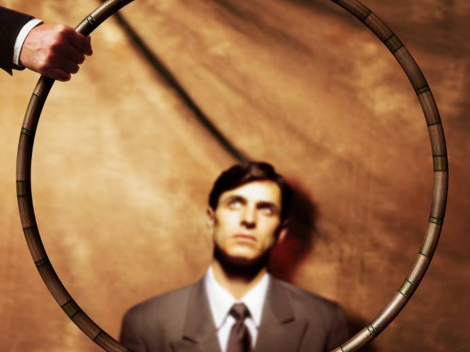
Personally, I believe no one should be forced to release their real-ID.
Rather than by law, I think a better alternative would be more voluntary or social verification as Facebook does, where people reveal their real ID because it’s in their interest.
Many of you may think that South Korea is a free and open society.
Well, I hope it WILL become one.
Thank you! It was great speaking with you today. I’m ready to answer your questions.
하지만 적어도 모두가 뭔가 바뀌어야 할 시점이란 것은 알고 있습니다.
개인적으로 한국에서 강제적인 실명제는 폐지되어야 한다고 봅니다.
법으로 규제하는 것이 아니라 페이스북에서 스스로 누구인지 인증할 필요가 있을 때 서로가 인증해주고 평가해주는 것 처럼 자발적 인증, 소셜 인증이 대안이라고 봅니다.
여러분은 한국이 비교적 개방되어 있고 자유로운 나라라고 생각할 수도 있겠습니다.
네! 정말 그런 나라가 되면 좋겠습니다.
감사합니다.
* 실명제 관련 글 :2011/07/29 네이트 3500만명 해킹, 이래도 실명제인가
2011/05/24 주민등록번호 없이 회원 가입 가능하다?
2011/03/10 실명제를 무덤으로 보내라
2011/01/04 ‘집단지성' 뛰어넘는 ‘소셜지성' 시대 개막
2010/07/06 악플러와 자살, 그리고 지겨운 강의
2010/06/06 아이핀도 믿을 수 없다는데 실명제에 기대는 이유
2010/04/08 실명제, 한국 인터넷 박제로 만들다
2009/06/22 사이버 망명, 선언에 불과하다
2008/09/09 '과다 정보 저장'이 개인정보 침해 주범
